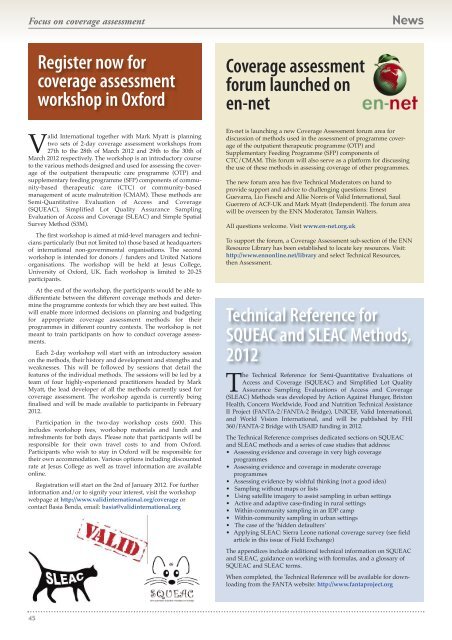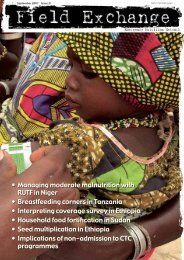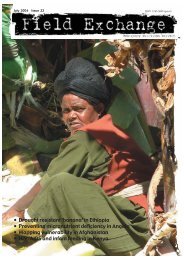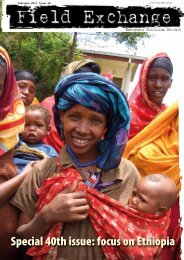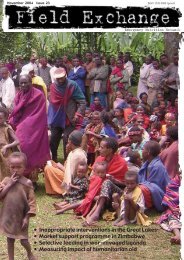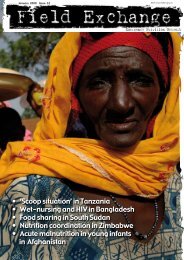Download a PDF of this issue - Field Exchange - Emergency ...
Download a PDF of this issue - Field Exchange - Emergency ...
Download a PDF of this issue - Field Exchange - Emergency ...
Create successful ePaper yourself
Turn your PDF publications into a flip-book with our unique Google optimized e-Paper software.
Focus on coverage assessment<br />
News<br />
Register now for<br />
coverage assessment<br />
workshop in Oxford<br />
Coverage assessment<br />
forum launched on<br />
en-net<br />
Valid International together with Mark Myatt is planning<br />
two sets <strong>of</strong> 2-day coverage assessment workshops from<br />
27th to the 28th <strong>of</strong> March 2012 and 29th to the 30th <strong>of</strong><br />
March 2012 respectively. The workshop is an introductory course<br />
to the various methods designed and used for assessing the coverage<br />
<strong>of</strong> the outpatient therapeutic care programme (OTP) and<br />
supplementary feeding programme (SFP) components <strong>of</strong> community-based<br />
therapeutic care (CTC) or community-based<br />
management <strong>of</strong> acute malnutrition (CMAM). These methods are<br />
Semi-Quantitative Evaluation <strong>of</strong> Access and Coverage<br />
(SQUEAC), Simplified Lot Quality Assurance Sampling<br />
Evaluation <strong>of</strong> Access and Coverage (SLEAC) and Simple Spatial<br />
Survey Method (S3M).<br />
The first workshop is aimed at mid-level managers and technicians<br />
particularly (but not limited to) those based at headquarters<br />
<strong>of</strong> international non-governmental organisations. The second<br />
workshop is intended for donors / funders and United Nations<br />
organisations. The workshop will be held at Jesus College,<br />
University <strong>of</strong> Oxford, UK. Each workshop is limited to 20-25<br />
participants.<br />
At the end <strong>of</strong> the workshop, the participants would be able to<br />
differentiate between the different coverage methods and determine<br />
the programme contexts for which they are best suited. This<br />
will enable more informed decisions on planning and budgeting<br />
for appropriate coverage assessment methods for their<br />
programmes in different country contexts. The workshop is not<br />
meant to train participants on how to conduct coverage assessments.<br />
Each 2-day workshop will start with an introductory session<br />
on the methods, their history and development and strengths and<br />
weaknesses. This will be followed by sessions that detail the<br />
features <strong>of</strong> the individual methods. The sessions will be led by a<br />
team <strong>of</strong> four highly-experienced practitioners headed by Mark<br />
Myatt, the lead developer <strong>of</strong> all the methods currently used for<br />
coverage assessment. The workshop agenda is currently being<br />
finalised and will be made available to participants in February<br />
2012.<br />
Participation in the two-day workshop costs £600. This<br />
includes workshop fees, workshop materials and lunch and<br />
refreshments for both days. Please note that participants will be<br />
responsible for their own travel costs to and from Oxford.<br />
Participants who wish to stay in Oxford will be responsible for<br />
their own accommodation. Various options including discounted<br />
rate at Jesus College as well as travel information are available<br />
online.<br />
Registration will start on the 2nd <strong>of</strong> January 2012. For further<br />
information and/or to signify your interest, visit the workshop<br />
webpage at http://www.validinternational.org/coverage or<br />
contact Basia Benda, email: basia@validinternational.org<br />
En-net is launching a new Coverage Assessment forum area for<br />
discussion <strong>of</strong> methods used in the assessment <strong>of</strong> programme coverage<br />
<strong>of</strong> the outpatient therapeutic programme (OTP) and<br />
Supplementary Feeding Programme (SFP) components <strong>of</strong><br />
CTC/CMAM. This forum will also serve as a platform for discussing<br />
the use <strong>of</strong> these methods in assessing coverage <strong>of</strong> other programmes.<br />
The new forum area has five Technical Moderators on hand to<br />
provide support and advice to challenging questions: Ernest<br />
Guevarra, Lio Fieschi and Allie Norris <strong>of</strong> Valid International, Saul<br />
Guerrero <strong>of</strong> ACF-UK and Mark Myatt (Independent). The forum area<br />
will be overseen by the ENN Moderator, Tamsin Walters.<br />
All questions welcome. Visit www.en-net.org.uk<br />
To support the forum, a Coverage Assessment sub-section <strong>of</strong> the ENN<br />
Resource Library has been established to locate key resources. Visit:<br />
http://www.ennonline.net/library and select Technical Resources,<br />
then Assessment.<br />
Technical Reference for<br />
SQUEAC and SLEAC Methods,<br />
2012<br />
The Technical Reference for Semi-Quantitative Evaluations <strong>of</strong><br />
Access and Coverage (SQUEAC) and Simplified Lot Quality<br />
Assurance Sampling Evaluations <strong>of</strong> Access and Coverage<br />
(SLEAC) Methods was developed by Action Against Hunger, Brixton<br />
Health, Concern Worldwide, Food and Nutrition Technical Assistance<br />
II Project (FANTA-2/FANTA-2 Bridge), UNICEF, Valid International,<br />
and World Vision International, and will be published by FHI<br />
360/FANTA-2 Bridge with USAID funding in 2012.<br />
The Technical Reference comprises dedicated sections on SQUEAC<br />
and SLEAC methods and a series <strong>of</strong> case studies that address:<br />
• Assessing evidence and coverage in very high coverage<br />
programmes<br />
• Assessing evidence and coverage in moderate coverage<br />
programmes<br />
• Assessing evidence by wishful thinking (not a good idea)<br />
• Sampling without maps or lists<br />
• Using satellite imagery to assist sampling in urban settings<br />
• Active and adaptive case-finding in rural settings<br />
• Within-community sampling in an IDP camp<br />
• Within-community sampling in urban settings<br />
• The case <strong>of</strong> the ‘hidden defaulters’<br />
• Applying SLEAC: Sierra Leone national coverage survey (see field<br />
article in <strong>this</strong> <strong>issue</strong> <strong>of</strong> <strong>Field</strong> <strong>Exchange</strong>)<br />
The appendices include additional technical information on SQUEAC<br />
and SLEAC, guidance on working with formulas, and a glossary <strong>of</strong><br />
SQUEAC and SLEAC terms.<br />
When completed, the Technical Reference will be available for downloading<br />
from the FANTA website: http://www.fantaproject.org<br />
45


